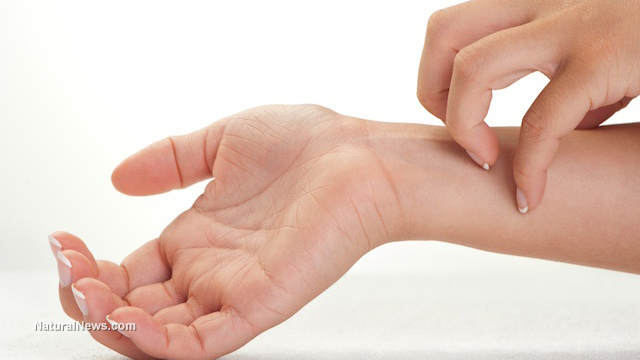
Common chemicals used in foams and spray paints linked to eczema: Study
Friday, February 10, 2023 by Zoey Sky
http://www.products.news/2023-02-10-common-chemicals-foams-spray-paints-linked-eczema.html

According to a recent government study, there is an alarming link between diisocyanates, a class of widely used chemicals, and eczema, a chronic inflammatory skin disease.
The study was published in the journal Science Advances.
The link between diisocyanates and eczema
According to the National Institute of Allergy and Infectious Diseases (NIAID), people with eczema experience painful symptoms like skin redness, severe itching, oozing from the skin and scaly rashes.
These symptoms can sometimes be agonizing and they can suddenly appear without any obvious triggers.
About 20 percent of children and 10 percent of adults in industrialized countries suffer from eczema. In the U.S., recorded eczema cases are three to six times higher than they were back in the 1970s.
For the study, researchers from the NIAID tried to learn more about how certain environmental pollutants may be contributing to this increase. They studied diisocyanates, which are used nationwide in various polyurethane products like foams, flues, spray paints, and glues.
The active portion of the diisocyanate molecule, the isocyanate side chain, is also a component that can trigger eczema.
The research team conducted experiments on animal subjects to find out why diisocyanates exposure could directly induce eczema on mouse skin. The findings suggest that this could be due to how skin bacteria deal with isocyanate.
Study findings revealed that when bacteria living on healthy skin are exposed to isocyanate, they are forced to adapt to survive the new environment. When they adapt, these bacteria alter their metabolism away from producing the lipids or oils that the skin needs to stay healthy.
This also suggests that eczema can potentially be treated by replacing post-exposure skin bacteria with healthy ones that behave normally.
The researchers wrote that this is the first report establishing that pollution may cause diseases by “disrupting metabolism in commensal microbiota.”
They added that continuing their research will help the scientists “further validate the association between environmental exposure to isocyanate or diisocyanates and eczema.” Continued research will also help confirm if this mechanism identified in mice works the same way in humans. (Related: Study: Eliminating certain foods from the diet can ease symptoms of eczema.)
Tips for relieving eczema
According to the American Academy of Dermatology (AAD), the best way to relieve itchy eczema is to get the condition under control. However, this takes time.
The AAD also recommends some tips for parents who want to provide children with temporary relief from their itchy skin:
- Distract the child by telling a story or letting them play with their favorite toy.
- Calm the stressed child by joining them in their favorite playtime activity.
- Tell the child to gently pinch the skin near eczema to relieve the itching instead of scratching it, which may further irritate the skin.
- Soak a clean towel in cool water and apply it as a cool compress to itchy skin.
- Add colloidal oatmeal to their bath water and let the child soak.
- Let your child soak in a bath and smear on the ointment.
To avoid making eczema itchier for children, the AAD advises parents not to tell their children to stop scratching.
This rarely works and can leave the child feeling stressed. It’s best to avoid stress because it can make their eczema flare.
Here are some home remedies that can help relieve eczema:
Aloe vera gel
Aloe vera gel comes from the leaves of the aloe plant.
A 2017 systematic review analyzed the effects of aloe vera on human health.
The researchers reported that aloe vera gel has antibacterial properties and antimicrobial properties. The gel can also boost the immune system and help heal wounds.
The antibacterial and antimicrobial effects of the gel can prevent skin infections, which are more likely to occur when a person has dry, cracked skin. Aloe vera’s wound-healing properties may also soothe broken skin and promote healing.
You can buy aloe vera gel in health stores or online. To save money, you can also buy an aloe vera plant and use the gel directly from its leaves.
When buying aloe vera gel, look for aloe gel products with few ingredients. Some products may contain preservatives, alcohol, fragrances and colors that can irritate sensitive skin and do more harm than good if you have eczema.
Alcohol and other drying ingredients could also make eczema worse.
If it’s your first time trying aloe vera gel, dab a very small amount of gel onto your skin to test for skin sensitivity. The gel can sometimes cause burning or stinging, but it is considered generally safe and effective for both children and adults.
Coconut oil
Coconut oil contains beneficial fatty acids that can help moisturize your skin, which can help if you have dry skin and eczema.
Data also shows that virgin coconut oil may protect the skin by helping to prevent inflammation and improving the health of the skin barrier.
In a 2014 study, scientists observed the effects of applying virgin coconut oil to the skin of children. Results showed that using the oil for at least eight weeks improved the symptoms of eczema.
Apply a bit of cold-pressed virgin coconut oil directly to the skin after bathing and at least several times a day. Use the coconut oil before going to bed to keep the skin moisturized overnight.
Keep in mind that extra-virgin coconut oil is generally solid at room temperature, but the warmth of your body turns it into liquid. You can buy extra-virgin coconut oil in health stores and online.
Avoid coconut oil if you are allergic to coconuts.
Honey
Honey is a natural antibacterial and anti-inflammatory agent that has been used as a home remedy to heal wounds for centuries.
Data from a 2016 review suggest that honey can help heal wounds and boost immune system function. This means honey can help protect your body against infections.
Another review has also found that honey can be used to treat different skin ailments like burns and wounds and that it has beneficial antibacterial properties.
When applied directly to eczema-affected skin, honey could help prevent infections, while also moisturizing the skin and speeding up healing.
If you have eczema, dab a little honey onto the affected area. You can also try Manuka honey products that are suitable for wound care and skin application.
Buy Manuka honey in drugstores and online.
Tea tree oil
Tea tree oil comes from the leaves of the Melaleuca alternifolia tree. The essential oil is often used to help with skin problems like eczema.
A 2013 review revealed that tea tree oil has anti-inflammatory, antibacterial and wound-healing properties. Using it may help relieve skin dryness and itching.
Tea tree oil can also help prevent infections. Remember that all essential oils must be diluted properly with a carrier oil before applying to your skin.
You can mix tea tree oil with carrier oils like almond or olive oil before applying the solution. You can also buy products that include tea tree oil in a diluted form to relieve symptoms of eczema.
Buy tea tree oil in health stores or online.
Use natural remedies like aloe vera, coconut oil and honey to avoid the painful side effects of eczema.
Go to Allergies.news to learn more about eczema and other skin health issues and allergies.
Watch the video below to learn more about home remedies for eczema and psoriasis.
This video is from the PatchSDA channel on Brighteon.com.
More related stories:
Use antioxidant-rich neem oil to address skin conditions like acne and eczema.
5 Natural treatments for eczema.
Exclusive breastfeeding reduces your baby’s risk of eczema later in life.
Sources include:
Tagged Under: Tags: allergies, atopic dermatitis, badhealth, badpollution, chemicals, chronic inflammatory skin disease, common chemicals, diisocyanates, eczema, foams, glue, research, skin disease, skin health, spray paint
RECENT ARTICLES


Green energy projects financially COLLAPSING around the world: Siemens wind turbine manufacturer latest casualty
By Ethan Huff

DUMPSTER DINNERS: Brits now seeking out EXPIRED food to consume as they cope with meteoric rise in food prices
By Cassie B.

First bite: Soft serve ice cream with mealworm topping debuts in Sweden
By Ramon Tomey

Using artificial sweeteners for weight loss can increase diabetes risk, warn researchers
By Zoey Sky
COPYRIGHT © 2017 PRODUCTS NEWS


